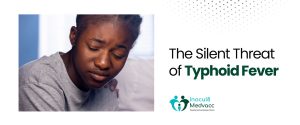
WHAT IS TYPHOID FEVER?
Contrary to popular belief, typhoid is not malaria or caused by the same organism. It is caused by a bacteria called “Salmonella typhii”, which usually causes severe sickness if not detected and treated well enough.
HOW IS TYPHOID FEVER TRANSMITTED?
It is easily gotten from eating or drinking contaminated food or water.
You might think that you’re certain of whatever source or process the food you buy comes from or passed through, or that as the saying goes, “dirty no Dey kill African man” and so nothing will happen, but that isn’t always the case.
- Contaminated food: undoubtedly, most of us are used to eating from local restaurants and bukas, tasting fruit or something as simple as groundnut before buying it without washing it or ensuring the source is sanitary enough. It is possible that the hands of the seller or even yours have been contaminated with the bacteria responsible for typhoid, so you contaminate the food with your hands and then eat it.
- Contaminated water: Sachet water (pure water) could pass as a staple in this country, and most of us are guilty of taking it, but there’s no means of identifying the source from which the water came. Some persons use untreated water from an unsanitary tank that is barely washed to make these things safe for people to ingest, making them unsafe and untrustworthy.
Those are essentially the two methods to get infected, but the primary agents are our hands. They easily and steadily get contaminated with any and everything. Hence, we must wash/ sanitize our hands as often as we remember and when we use the toilet.
Also, avoid leaving foods uncovered and washing fruits before eating them or buying whole fruits rather than those cut in pieces.
HOW TO FIND OUT YOUR TYPHOID STATUS
Essentially, when you begin to feel ill and you don’t understand your symptoms, it is advised that you do a test to help confirm and narrow your symptoms down to a particular cause.
A stool, blood or bone marrow culture is needed to confirm your typhoid status.
WHAT ARE THE SYMPTOMS OF TYPHOID?
When infected, this bacteria can remain in the body for a while and multiply until it is enough to wear you down.
Symptoms of typhoid are often mistaken for that of malaria, but there is a significant difference between the two, and it mostly lies in severity. These symptoms include:
- High fever: you would experience a burning rise in temperature between 39-40°C.
- Severe headache: your head feels heavy and there is a severe pounding sensation that doesn’t seem to resolve even with painkillers.
- Excessive vomiting: this could be confused with malaria, but they share a similarity.
- Severe abdominal pain: the pain feels crushing and discomforting in the upper part of the abdomen.
- Weakness.
- Anaemia, or blood loss.
- Low heart rate.
- Diarrhea or constipation.
- Loss of appetite.
Not everyone would experience all of this at the same time, but at least two or more of these symptoms would present.
ARE THERE OTHER CONDITIONS THAT CAN RESULT FROM TYPHOID?
Yes, typhoid can lead to several other complications that could be life-threatening. When the infection sets in, it could take a while before it eventually causes a problem. Here are some complications that could result if typhoid is not treated properly:
- Intestinal perforation: This means that your intestines are damaged due to the bacteria destroying the walls of the small intestine, thereby causing severe pain.
- Gastrointestinal haemorrhage: Also known as bleeding in the abdomen, precisely the Intestine.
- Anaemia: Your body becomes pale as it fails to produce enough blood since the infection can spread to the colon, the liver, and other parts to cause even more large-scale damage.
- Death, if improperly treated and neglected, but this is rare.
HOW TO PREVENT TYPHOID INFECTION
The typhoid vaccine is currently the cheapest and safest way to prevent typhoid fever. It is effective and protects against typhoid infection for up to three years.
However, there are other means to help reduce the risk of infection, which are:
- Washing of hands frequently
- Avoiding sticking fingers in the mouth
- Washing of fruits and vegetables before consumption
- Drinking clean portable water
- Minimising the amount of food consumed at local restaurants.
Protect yourself today by getting vaccinated.
Click here to book your vaccination now.
